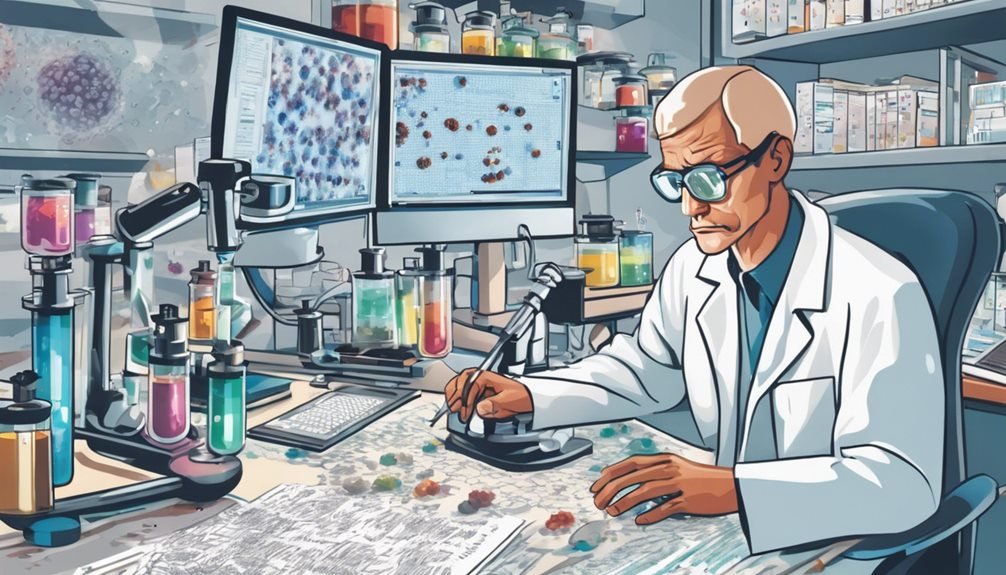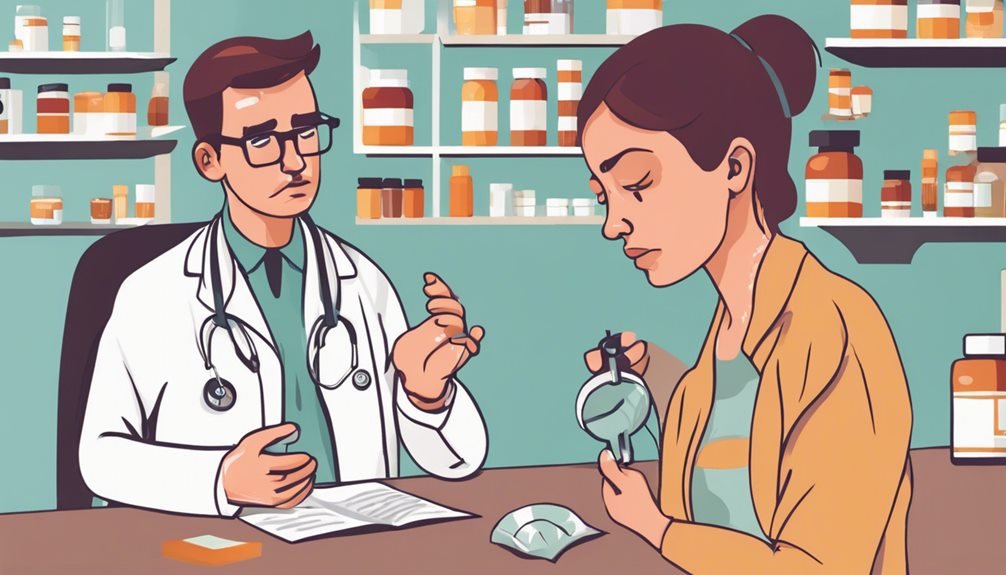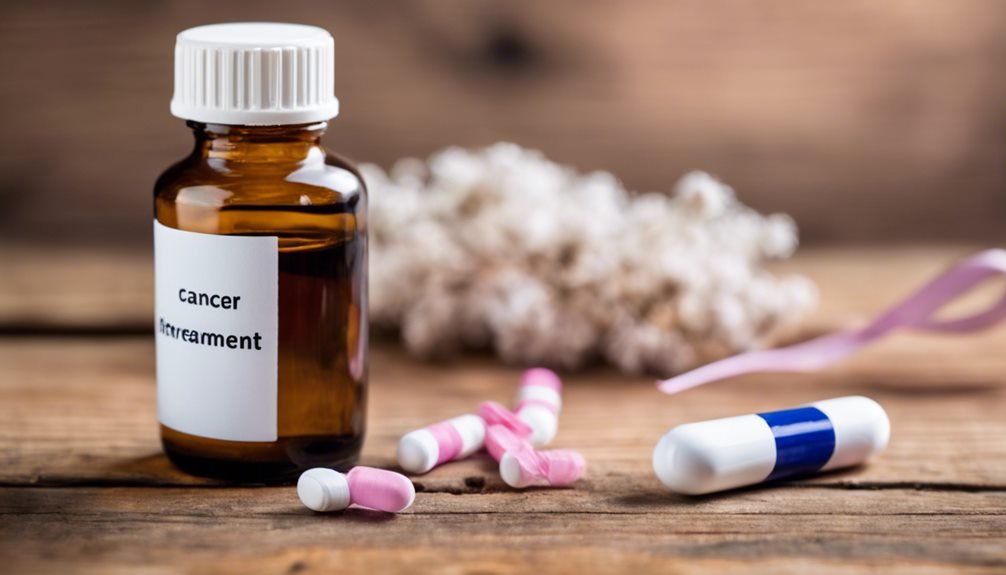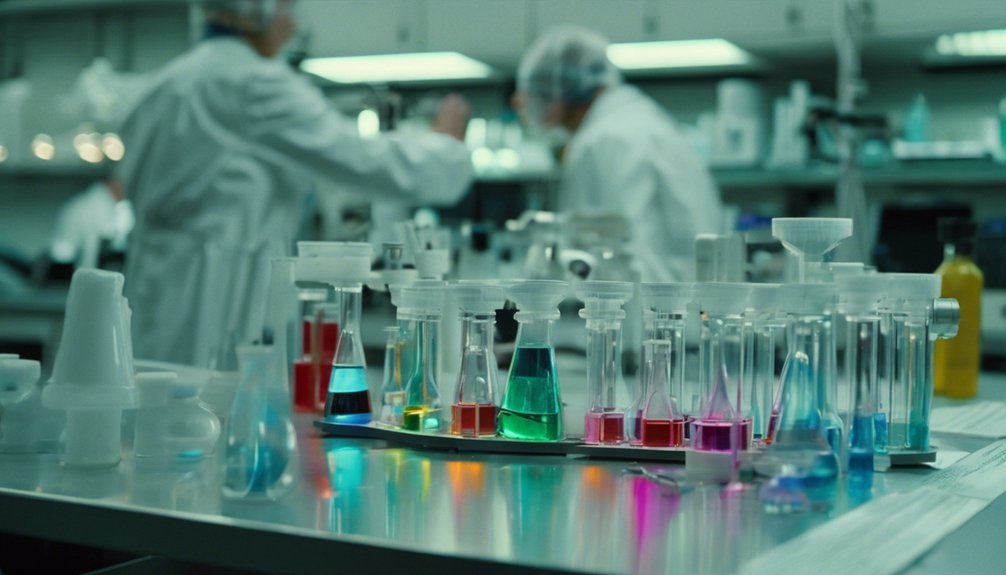Did you know that Vitamin B17, also known as amygdalin, gained popularity in the 1970s as a natural cancer treatment, with some proponents advocating for its use to combat the disease? While its proponents highlight its potential benefits in fighting cancer cells, the controversy surrounding its safety and efficacy continues to divide opinions among researchers and healthcare professionals. Stay tuned to unravel the truth behind the Vitamin B17 and cancer debate, as we explore the scientific evidence, patient testimonials, and expert insights on this intriguing topic.
Key Takeaways
- Lack of scientific evidence for anti-cancer properties.
- Historical controversies and safety concerns with cyanide.
- Need for further research and clinical trials.
- Expert recommendations favor proven treatments like chemotherapy.
- Importance of consulting healthcare providers before considering alternative treatments.
The History of Vitamin B17
Vitamin B17, also known as amygdalin, has a controversial history intertwined with claims of its potential anti-cancer properties.
The historical controversy surrounding Vitamin B17 dates back to the 1950s when it was first proposed as a potential treatment for cancer. Despite its cultural significance in certain alternative medicine circles, the use of Vitamin B17 as a cancer treatment remains highly contentious within the medical community.
The controversy stems from the compound's association with cyanide, a toxic substance that amygdalin releases when metabolized in the body. While some proponents believe that the cyanide targets and destroys cancer cells specifically, there's insufficient scientific evidence to support this claim.
The cultural significance of Vitamin B17 lies in its ties to traditional medicine practices, particularly in certain cultures where apricot kernels, a rich source of amygdalin, have been used for their perceived health benefits. However, caution is warranted as high doses of amygdalin can lead to cyanide poisoning, underscoring the importance of consulting healthcare professionals before considering its use.
What Is Vitamin B17?
Commonly referred to as amygdalin, Vitamin B17 is a naturally occurring compound found in various seeds, pits, and kernels of fruits, including apricots, peaches, and bitter almonds. This vitamin has gained attention due to claims about its potential role in cancer treatment. However, it is essential to understand its natural sources and composition before delving into these claims.
| Natural Sources of Vitamin B17 | Fruits | Seeds/Nuts |
|---|---|---|
| Apricots | Apple Seeds | Bitter Almonds |
| Peaches | Plum Seeds | Macadamia Nuts |
| Cherries | Cherry Stones | Flaxseeds |
| Prunes | Pear Seeds | Lima Beans |
These natural sources provide amygdalin, which some believe can help in cancer treatment. However, further research is needed to understand its efficacy and safety in this regard. Remember to consult healthcare professionals before considering any alternative treatments for cancer.
Claims About Vitamin B17 and Cancer

Numerous assertions have surfaced regarding the potential benefits of amygdalin, commonly known as Vitamin B17, in the context of cancer treatment. The efficacy debate surrounding Vitamin B17 has been a subject of much controversy within the medical community.
While some patient testimonials suggest positive outcomes from using amygdalin as a cancer treatment, these claims are often not supported by scientific evidence from rigorous clinical trials.
The medical community emphasizes the importance of evidence-based medicine, which relies on clinical trials to evaluate the safety and efficacy of treatments. Despite patient testimonials praising the benefits of Vitamin B17, the lack of substantial clinical trial data makes it challenging for healthcare professionals to endorse its use as a cancer treatment.
It is crucial to approach claims about Vitamin B17 with caution and skepticism until supported by robust scientific evidence. As the efficacy debate continues, further research through well-designed clinical trials is necessary to determine the true potential of amygdalin in cancer treatment.
Mechanism of Action
The mechanism of action of amygdalin, also known as Vitamin B17, in the context of cancer treatment is a topic of interest that warrants a closer examination. Amygdalin is believed to exert its effects through multiple pathways, including inducing cellular apoptosis and inhibiting tumor growth.
Cellular apoptosis, a programmed cell death process, is crucial in cancer treatment as it helps eliminate abnormal cells. Amygdalin has been suggested to promote apoptosis in cancer cells, potentially aiding in reducing tumor burden.
Furthermore, amygdalin is thought to inhibit tumor growth by interfering with specific pathways involved in cell proliferation and survival.
While these mechanisms sound promising, it's important to note that the evidence supporting the efficacy of amygdalin in cancer treatment is still debated. Scientific research is ongoing to better understand the precise mechanisms of action of amygdalin and its potential role in cancer therapy. In the next section, we'll delve deeper into the scientific research and evidence surrounding the use of Vitamin B17 in cancer treatment.
Scientific Research and Evidence

Research exploring the efficacy of amygdalin, commonly known as Vitamin B17, in cancer treatment has garnered attention in the scientific community. Clinical trials have been conducted to assess the potential benefits of amygdalin in cancer therapy. These trials aim to evaluate the safety and effectiveness of amygdalin in treating various types of cancer. Meta-analyses of available data from these trials have been performed to provide a comprehensive overview of the collective findings.
In the realm of scientific research, clinical trials are crucial for determining the actual impact of amygdalin on cancer progression and patient outcomes. These studies follow rigorous protocols to ensure reliable and unbiased results.
Meta-analyses, which combine data from multiple trials, can offer a more comprehensive understanding of the overall effectiveness of amygdalin in cancer treatment. By synthesizing findings from different studies, meta-analyses provide valuable insights that can guide future research and clinical practice.
It's essential to interpret these results critically and consider the limitations of each study when assessing the scientific evidence supporting the use of amygdalin in cancer treatment.
Potential Benefits of Vitamin B17
Studies have indicated potential benefits associated with the consumption of amygdalin, commonly referred to as Vitamin B17. When considering potential health benefits, Vitamin B17 has been suggested to have a role in cancer treatment. Here are some of the benefits that have been associated with Vitamin B17 consumption:
- Antioxidant Properties: Vitamin B17 is believed to possess antioxidant properties that can help in reducing oxidative stress in the body.
- Immune System Support: Some studies suggest that Vitamin B17 may support the immune system, helping the body in its natural defense mechanisms.
- Anti-Inflammatory Effects: Vitamin B17 is thought to have anti-inflammatory effects which could potentially aid in reducing inflammation in the body.
- Cellular Health: There's some evidence to suggest that Vitamin B17 may play a role in promoting overall cellular health, which is crucial in cancer treatment.
These potential benefits highlight the importance of further research to fully understand the impact of Vitamin B17 on health and its potential role in cancer treatment.
Potential Risks and Side Effects

In recent evaluations, potential risks and side effects have been associated with the consumption of amygdalin, commonly known as Vitamin B17. Safety concerns arise due to the fact that amygdalin can break down into cyanide in the body, leading to toxicity. Adverse reactions linked to cyanide exposure include nausea, vomiting, headache, dizziness, and in severe cases, even coma or death.
The amount of cyanide released from amygdalin-containing foods or supplements can vary, making it challenging to determine a safe dosage. Furthermore, individuals with certain health conditions, such as kidney problems or deficiency in specific enzymes that help detoxify cyanide, may be at a higher risk of experiencing harmful effects.
It's essential to consider these safety concerns and potential adverse reactions before using products containing Vitamin B17. Consulting with a healthcare provider is crucial to assess individual risks and benefits, ensuring the safe and appropriate use of amygdalin in any form.
Legal Status and Controversies
Amid ongoing discussions surrounding Vitamin B17, the legal status and controversies surrounding its use have sparked considerable debate within the healthcare and regulatory communities. Here's a breakdown of important points to consider:
- Legal challenges: Vitamin B17, also known as amygdalin, has faced legal challenges in various countries due to concerns about its safety and efficacy in treating cancer.
- Controversies: There are ongoing controversies surrounding the use of Vitamin B17 for cancer treatment, with some proponents advocating for its benefits while critics raise safety concerns and question its legality.
- Safety concerns: Regulatory bodies express safety concerns regarding Vitamin B17 due to its potential toxicity and lack of scientifically proven benefits in cancer treatment.
- Regulations: Many countries have regulations in place restricting the use of Vitamin B17, with some categorizing it as an unapproved drug or supplement, limiting its availability for cancer patients.
It is essential to navigate these legal and regulatory landscapes carefully when considering Vitamin B17 as a potential cancer treatment option.
Alternative Cancer Treatments

Exploring alternative cancer treatments beyond conventional approaches is a topic of increasing interest among patients seeking additional options. Patient experiences with alternative treatments vary widely, with some reporting positive outcomes while others find little benefit. It's crucial to approach alternative treatments with caution and skepticism, relying on evidence from clinical trials to guide decisions.
Clinical trials play a vital role in evaluating the safety and efficacy of alternative cancer treatments. These trials provide valuable insights into the potential benefits and risks associated with different approaches, helping patients make informed choices about their care.
While some alternative treatments may offer promise, it's essential to consult with healthcare providers and consider the evidence before pursuing these options.
Ultimately, the decision to explore alternative cancer treatments should be made in consultation with a healthcare team, considering individual circumstances and treatment goals. By staying informed and relying on evidence-based practices, patients can navigate the complex landscape of cancer care with confidence and clarity.
Personal Stories and Anecdotes
Consider the role that personal stories and anecdotes play in shaping perspectives on alternative cancer treatments. Personal testimonials and anecdotes can provide valuable insights into the effectiveness of treatments like Vitamin B17 in managing cancer. Here are some key points to help you understand the significance of personal stories and anecdotes in this context:
- Empathy and Connection: Personal testimonials create a sense of empathy and connection, allowing individuals to relate to others' experiences with alternative cancer treatments.
- Inspiration and Hope: Anecdotes of successful outcomes can inspire hope in individuals battling cancer, encouraging them to explore different treatment options.
- Caution and Realism: On the other hand, negative experiences shared through anecdotes can also serve as a cautionary tale, highlighting potential risks or limitations of certain treatments.
- Informing Decision-Making: Hearing diverse anecdotes and personal stories can provide a more comprehensive view, aiding individuals in making informed decisions about their cancer treatment journey.
Considering these points can help you navigate the realm of personal stories and anecdotes surrounding alternative cancer treatments like Vitamin B17.
Expert Opinions and Recommendations

Expert opinions and recommendations hold significant weight in guiding individuals towards evidence-based cancer treatments. When it comes to Vitamin B17 and cancer, there are controversies surrounding its effectiveness and safety. Many experts in the field of oncology and medical research caution against using Vitamin B17 as a treatment for cancer due to a lack of scientific evidence supporting its efficacy.
Recommendations from reputable medical organizations emphasize the importance of relying on proven treatments like chemotherapy, radiation therapy, and surgery for managing cancer. Safety concerns regarding Vitamin B17 revolve around the potential risks of cyanide poisoning, especially when taken in high doses.
This risk is particularly concerning for individuals already undergoing cancer treatments that may interact negatively with Vitamin B17.
In light of these expert opinions and safety concerns, it's crucial for individuals considering alternative cancer treatments to consult with their healthcare providers before incorporating Vitamin B17 into their regimen. Making informed decisions based on evidence-based recommendations is paramount in ensuring the best possible outcomes in cancer care.
Conclusion: Should You Consider Vitamin B17?
Given the expert cautions and safety considerations surrounding Vitamin B17 use in cancer treatment, your decision regarding whether to consider Vitamin B17 should be approached with careful deliberation and consultation with your healthcare provider. Here are some key points to consider:
- Personal Experiences: While individual anecdotes may support the use of Vitamin B17 in cancer treatment, remember that personal experiences can vary greatly, and what works for one person may not work for another.
- Cost Analysis: Vitamin B17 treatments can be expensive, and insurance may not cover these alternative therapies. Consider the financial implications of incorporating Vitamin B17 into your treatment plan.
- Consultation with Healthcare Provider: Your healthcare provider is best equipped to guide you on whether Vitamin B17 is a suitable option for your specific cancer type and overall health status.
- Potential Risks and Benefits: Be aware of the potential risks and benefits associated with Vitamin B17 use, and weigh these factors carefully before making a decision.
Frequently Asked Questions
Can Vitamin B17 Cure Cancer?
You may wonder if vitamin B17 can cure cancer. It's crucial to note that current efficacy studies don't support this claim.
In fact, consuming vitamin B17, also known as amygdalin, carries potential risks as it can release cyanide in the body.
It's essential to rely on proven cancer treatments recommended by healthcare professionals for effective management.
Always consult with your healthcare provider before trying any alternative therapies for cancer.
Are There Any Clinical Trials on Vitamin B17?
When exploring the topic of clinical trials on vitamin B17, it's essential to focus on evidence-based research and scientific validity. By examining relevant studies and trials, you can gain valuable insights into the potential effects of vitamin B17 on health outcomes. Checking for credible sources and reliable data will help you make informed decisions about incorporating this supplement into your health regimen.
Is Vitamin B17 Safe for Everyone to Use?
Using Vitamin B17 may not be safe for everyone due to safety concerns and potential risks associated with its cyanide content. Before considering its use, consult with a healthcare provider to discuss your individual health status and evaluate the risks versus benefits.
While some alternative practitioners believe in its benefits, mainstream medical professionals caution against its use due to the risk of cyanide toxicity. Always prioritize safety and evidence-based treatments when making health decisions.
How Can I Incorporate Vitamin B17 Into My Diet?
To incorporate vitamin B17 into your diet, consider adding apricot kernels to smoothies or salads. Be cautious with dosage, as excessive intake may lead to cyanide toxicity. Consult a healthcare provider before adding B17 supplements. Benefits of B17 are largely anecdotal; scientific evidence is lacking.
Are There Any Interactions With Other Medications?
When considering drug interactions, it's crucial to consult with a healthcare provider before adding Vitamin B17 to your regimen. Some medications may have interactions with this supplement, potentially affecting their efficacy or causing adverse effects. Safety concerns arise due to the potential for these interactions, emphasizing the importance of seeking professional advice.
Prioritize your health by discussing any concerns about drug interactions and safety with your healthcare provider before incorporating Vitamin B17 into your diet.
Conclusion
In the labyrinth of cancer treatments, the enigma of Vitamin B17 persists. Despite lacking concrete scientific proof, its allure remains potent, drawing hopeful souls seeking an alternative cure. As you navigate the murky waters of holistic remedies, remember to tread cautiously. The siren song of anecdotal accounts may beckon, but evidence-based decisions are the lighthouse guiding you through the stormy seas of uncertainty. Proceed with caution, for truth may be elusive in the world of Vitamin B17 and cancer.





